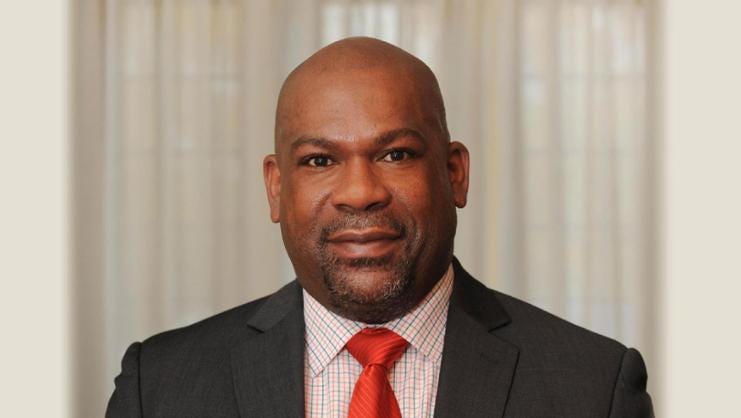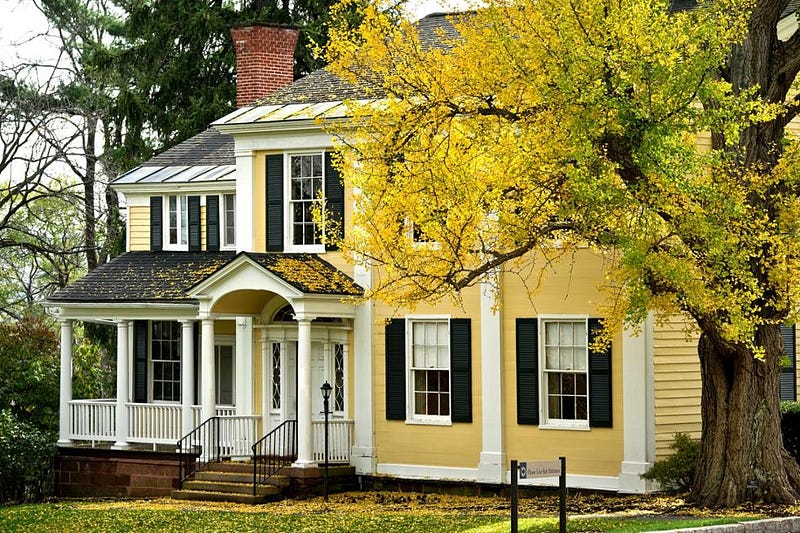
Christopher Card joined Hamilton as the new VP and Dean of Students this summer. Photo courtesy of Hamilton College.
What does being Dean of Students entail?
My job is really to focus on the student experience outside the classroom and to ensure that the offerings, engagement and the Hamilton experience comport well with what happens in the classroom. But I also don’t see these as distinct lines. You’ll hear me say often that my goal in part is to blur the lines between what happens in the classroom and what happens outside, so really the whole campus can be one seamless learning experience.
My focus is on all of the things that complement life in the classroom and help students excel as scholars. We want to ensure that life is full. We are really looking at the whole student and educating the whole student.
My job isn’t to tell you all what to think! I see my job as helping the proverbial horse navigate itself to water. Whether the horse drinks the water or not, that’s really up to the horse. It really is about how we create a qualitative experience, an enriching experience and a full experience to help support you as a scholar. That can mean responding to students in a variety of circumstances — students may have questions about their academic life or social life or questions about how to navigate situations. We often engage parents who have concerns about their students.
We really try to not only help students become strong self-advocates but advocate on their behalf. I see my role as a “Chief Advocate” for students. And I work with a strong team who are also committed to advocacy and student growth. So it’s a combined role — I do see presence on campus as a critical part of what I do because that’s how I get to know the culture and interests of students.
How do you find a way to connect with students on campus? How can students make a connection with you?
That’s a critical thing — so part of it is that I live on campus. In all the institutions I’ve worked in, I’ve lived on campus; that’s very important to me because I do get a sense of the pace and the tenor and the culture of the place. I get a chance to share the lived lives of students and get a sense of what the issues are and what it is like to walk up and down this hill. I get a chance to dine in the dining facilities to hear about how great the Diner is and how there should be sushi everywhere.
I haven’t ridden the jitney yet, but I know about it, and I get to see a sense of where students want to go and why. So part of it is getting to be present and observe. The other part of presence is attending the events — going to places that are important to students. Not only to just get a sense of what the programming and the engagement are, but also to get a sense of what the quality is of our facilities.
The other part of it is getting out there and beginning to meet students, hearing from them and getting to meet them where they are comfortable — and to some extent — in their domain. I also have an open-door policy. It still is a learning and intake process for me.
I’ve been trying to get around and meet students individually and collectively.
I do hope that over time students will see me as a strong resource in their own journey through Hamilton. At any point, a student can come to my office or send me an email and say, “Hey, can we meet?” I’m happy to be invited to a meeting someplace else; I’ve had conversations over lunch or in dining spaces.
I do hope that once my house is settled (I am still somewhat living out of boxes) that it will be a space where I am able to engage students and have students over for dinner and conversations. This has been part of my practice throughout my career and my home: to, within reason, welcome students in for conversations. I do hope that my reputation will be one of someone who is present, engaged and approachable.
Is there anything new about how you will approach your role at Hamilton versus your past experiences?
Part of why I’ve engaged in those past practices is because they’ve served me well and they’ve served the institution well. I think it’s important to take time to get familiar with the campus. So it’s still a little early for me to figure out what Hamilton’s specific nuances are. What I know will not change is this commitment to be present, engaged and accessible. I think as I get a sense of how Hamilton students prefer to meet, where they prefer to meet and what the tone of our conversations is like — I have an adaptive style, so I think I will manage to figure out how to be able to respond and be more accessible. I’m still learning the paces of Hamilton culture.

The Dean of Students office is located in Elihu Root House, on the east side of campus. Photo courtesy of Hamilton College.
What are some of your goals for this year?
That’s one of the things I’m assessing. Seeing students as partners is a critical part — how do I ensure that what students see as their priorities for their success syncs with what my staff and I want to take on?
Initially, there are a few things that are worth looking at. One is just generally the engagement level of students overall. I was at the activities fair a couple of weeks ago, and it is clear that we have a lot of stuff going on and students are interested, but I also know that’s just the start of the term. I’m curious to see if that level of interest and engagement that I noticed under that tent is going to be sustained over the year.
I know that we have challenges in leadership, with being able to bring on new organizations and sustain new organizations and membership. And so I think over the long term leadership development is a space that I do want to explore. As I learn more and more about Hamilton, some of the things that are in the lore are that this is a place where students develop great writing skills and great oratory skills. I’d like us to get to a place where Hamilton is also known to produce great leaders.
I think we’re doing a lot of work behind the scenes, but I want to amplify that, particularly as we look at a changing world and labor market outside of Hamilton where these leadership skills are going to be absolutely critical. What happens when you transition through four years of Hamilton and how do you come out as a strong leader? I mean, many of you already come to us as strong leaders, but that is a space I want to focus on.
I also want to think about: given that we are a residential college and that is critical to our identity as a small college, what does that mean for us? Are there ways that we can deepen the residential experience given that it is a critical space for us? I want us to make sure that as we think about residency and know that it is a compelling aspect of the Hamilton experience and that it is strong, it is vibrant, it is diverse and it is rich.
Now that we have a new Vice President for DEI (Diversity, Equity and Inclusion) another area for me is to ensure how we really weave our commitment to DEI into the broad scope of the work that we do. Students should be able to experience a place where they feel they belong and that they are valued, regardless of difference or identities.
How will the presence of COVID affect your role on campus this year?
My sense is that Hamilton had a tough time with COVID last year. Well, every college in the nation had a tough time with COVID. I know for me, one of the darkest days in my life as a college administrator was when we had to see the students go home. I hope that we never get to that space again.
I think that we are in a position to look forward and move forward. Now, this is not to presume that COVID has gone away. An important aspect is how well students comply and take care of themselves and take care of each other. I hope that folks have emerged from this with a strong sense of how important it is to be a good community member and know your own duty to keep the rest of the community safe.
I think there is a notion for some that this is not fully behind us. We are able to reconnect socially — being able to meet in groups is something that is a big part of the tradition of the work that we do. But I don’t think that we can get complacent.
Even though we might not be doing testing or surveillance…my hope is that we have educated the community enough. And by the community, I don’t just mean students. I mean staff and faculty as well. So that we don’t get back to the situation where COVID was rampant across the institutions depends on every single one of us…I think we have to be mindful of what happened last year, but we can’t be shackled by that.
What are you looking forward to this year?
I’m excited to meet students and figure out from their perspective what it is that I can do to enrich their experience at Hamilton. There’s a whole lot of stuff we’ve been doing and doing very very well, and there’s a reason we have the brand that we have. There’s a reason why we are Hamilton and why so many folks want to come here. I’ve heard that we’ve had a couple of cycles lately of oversubscription and I think that speaks to the power of what we deliver and the experience that students have.
But I also know that there have been spaces where we have been doing some things the same for a long time. So part of me wants to assess what we do and see if there are things that still need to be done. As we get new students year after year, how far exactly is this first-year student body going to change in Hamilton? A quarter of our students are new — they have never experienced this space in this intensive way before. So how do we make sure that given all our traditions and given our practices that what we are doing is still relevant to students who are coming in now and who will continue to come?
But really, it’s just spending a lot of time to make sure that we are aligned on our priorities with the student body about where the institution should be, so that folks have a lot of good things to say about how rewarding the experience was and that it was a good decision to come to Hamilton.